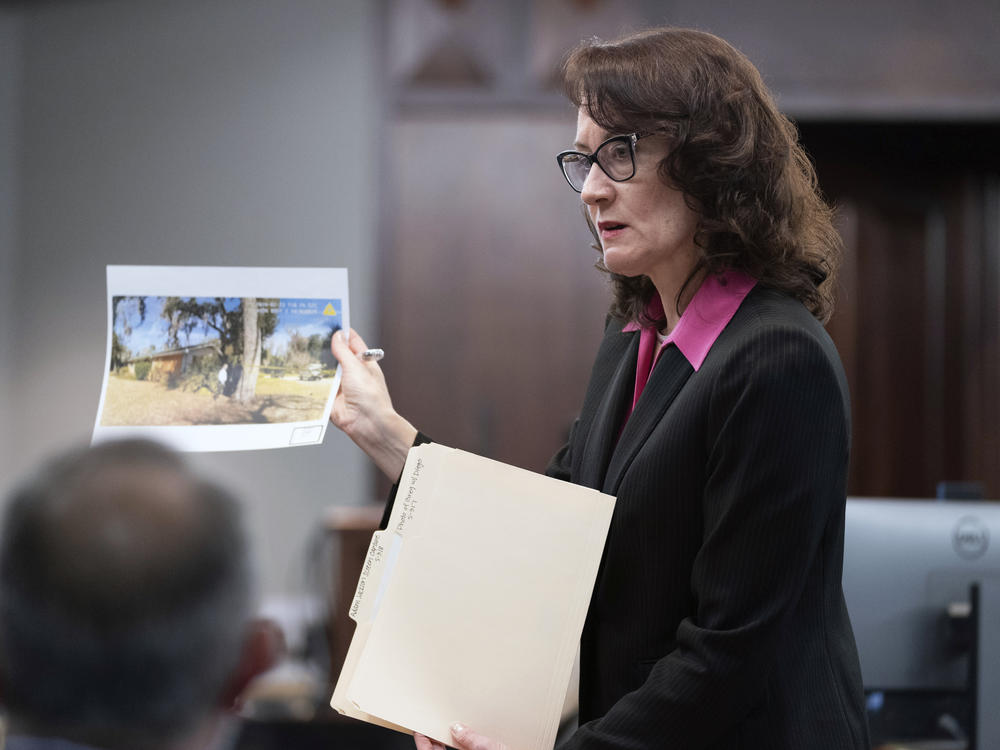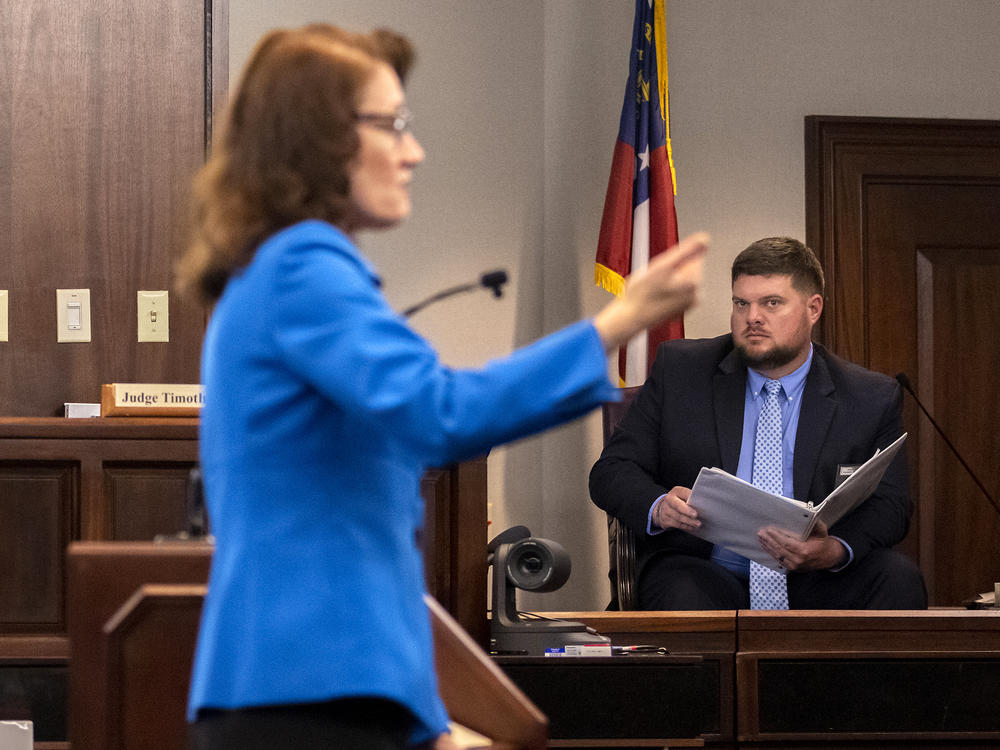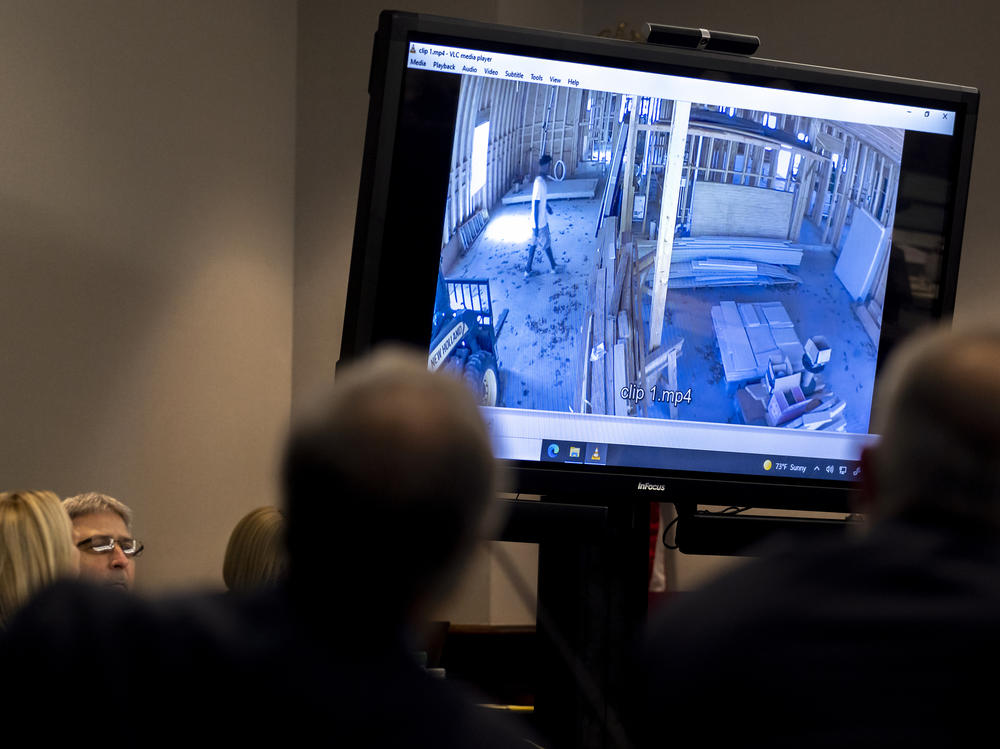Section Branding
Header Content
Prosecutors have used the defendants' own words in the Ahmaud Arbery case
Primary Content
The state of Georgia has been building its murder case against three white men: Greg McMichael, Travis McMichael and William "Roddie" Bryan, for the killing of Ahmaud Arbery, a Black man, on Feb. 23, 2020.
The McMichaels and Bryan face charges of murder, aggravated assault and false imprisonment for chasing Arbery down a residential street in their trucks and shooting him three times with a shotgun.
Self-defense or vigilantism?
Over five days of testimony, witnesses for the prosecution have explained, using the defendants' own words from transcripts of police interviews and 911 calls, the extraordinary steps the three men took to protect their neighborhood from someone they considered an intruder.
According to testimony, Greg McMichael told authorities that when he saw a Black man "hauling a**" down his street, he got his adult son, Travis, and the pair armed themselves and pursued Arbery.
The defense has argued that the three men suspected Arbery of burglary after reports of theft in the neighborhood, and they acted in self-defense when Arbery fought back during a citizen's arrest.
Officers quote the defendants' interviews with police
Along with graphic video recorded by police body cameras and by Bryan's cellphone, state prosecutor Linda Dunikoski centered her case on testimony from law enforcement officers, including Glynn County Detective Parker Marcy, who had interviewed Greg McMichael after the shooting. On the stand, Marcy quoted Greg McMichael's account of the moments before his son shot Arbery.
"He says, 'I said stop, you know, I'll blow your [expletive] head off or something. I was trying to convey to this guy we were not playing, you know,' " quoted Marcy.
Glynn County Sgt. Roderick Nohilly also testified to what Greg McMichael said about Arbery at police headquarters the day after the shooting, quoting McMichael saying, that Arbery "was trapped like a rat, I think he was wanting to flee and he realized something, that he was not going to get away."
On cross-examination, Greg McMichael's lawyer, Frank Hogue, read what his client told Nohilly about the struggle between his son Travis and Ahmaud Arbery.
" 'His intention was to grab that shotgun and probably shoot Travis, that's in my mind.' Those are his words, right?" asked Hogue.
"Yes," replied Nohilly.
Stephan Lowrey, a criminal investigator for Glynn County at the time, spent hours on the stand on Wednesday and testified that defendant Bryan told police he gave chase in his pickup truck, forced Arbery into a ditch and then angled his truck at him at least three more times.
Quoting Bryan, Lowrey recounted, "I kind of went on past him [Arbery], 'cause I didn't hit him, wish I would have; might have took him out and not got him shot."
Satilla Shores neighbors testify
The jury also heard recordings of three 911 calls made by Greg and Travis McMichael about strangers in the neighborhood and heard testimony from neighbor Matthew Albenze, who first reported to police about Arbery wandering around an under-construction house in the neighborhood on the day he was killed, but called a nonemergency number rather than 911 because Albenze "did not see an emergency."
The owner of the construction site, Larry English, testified at length on Thursday in a prerecorded deposition played for jurors along with surveillance camera footage from the property and numerous 911 calls in which English reported trespassers on camera.
"At any point in time, did you authorize the McMichaels to ever confront anybody on your site?" asked prosecutor Paul Camarillo.
"No," replied English.
"Or act on the behalf of the police on your site?" Camarillo followed.
"No" confirmed English.
Officer Robert Rash testifies to previous calls to the property
Glynn County Police Officer Robert Rash testified that he was in direct contact with English, who sent the officer some of the surveillance video. Body camera footage played in court shows Rash responding to a prior 911 call to the property, when Travis McMichael reported seeing a Black man on the property at night.
Rash, standing near the McMichaels and with English on speakerphone, wonders out loud if it's the same man caught on camera before, a "Black male" with "kind of a twist hair, he's lighter skinned and he's got sleeve tattoos."
In the video, Rash tells the McMichaels, "All the times on the video that Mr. English sent me, it's always been just in there plundering around, he hasn't seen him actually take anything."
"It's criminal trespassing," responds Greg McMichael, in the video.
"Yeah, yeah, at the very least," replies Rash. He then brings up a reported gun theft down the street a few weeks earlier, "but we got on video the car ... they were from another neighborhood."
Dunikoski followed up with Rash on the stand. "Was it your intent to deputize Greg McMichael or Travis McMichael?" she asks.
"Never," states Rash.
"What did you want them to be?" Dunikoski counters.
"Witnesses," Rash replies.
In cross-examination, the defense has portrayed a neighborhood on edge from break-ins and say Arbery fit the description of a Black man seen on surveillance video inside the Satilla Shores construction site.
What's next in the trial
Testimony is expected to last at least another week, as the nearly all-white jury continues to weigh whether the defendants had cause to pursue Arbery and whether Travis McMichael acted in self-defense when Arbery fought back.
Copyright 2021 NPR. To see more, visit https://www.npr.org.



